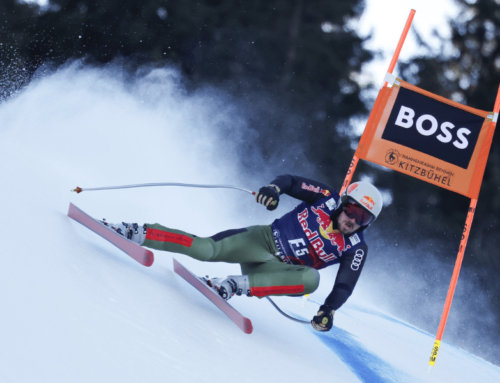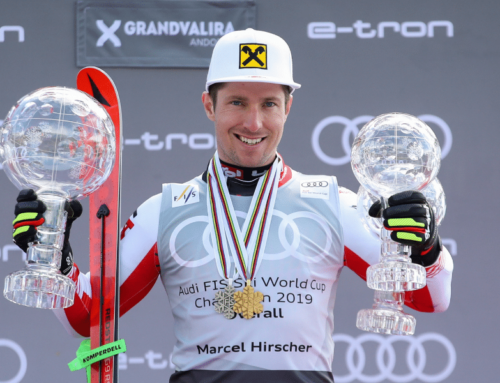In high gear: At the late age of 33, Carl Swenson is leading the pack, both on snow and on dirt
In high gear: At the late age of 33, Carl Swenson is leading the pack, both on snow and on dirt Carl Swenson was there, on August 3, when America’s best nordic skiers gathered at Salt Lake International Airport, setting out for a month-long camp in New Zealand. As Swenson helped his buddies shuttle their gear, he joined in some chest-thumping trash-talk; the alpine team was going to be “down under” too, and the two groups were planning an epic soccer match.
Carl Swenson was there, on August 3, when America’s best nordic skiers gathered at Salt Lake International Airport, setting out for a month-long camp in New Zealand. As Swenson helped his buddies shuttle their gear, he joined in some chest-thumping trash-talk; the alpine team was going to be “down under” too, and the two groups were planning an epic soccer match.
But when the time came to board the plane, Swenson, the team captain, waved goodbye, walked back to short-term parking, and drove the U.S. Ski Team van back up Parley’s Canyon to Park City. And when the much-hyped soccer-field showdown finally goes off, Swenson will be on his way to Lugano, Switzerland, for the world championships of mountain biking.
Few athletes make it to this level in two notoriously difficult sports, and hardly anyone does it at age 33.
the breakthrough
Last February, when Swenson took a career-best fifth place at the FIS Nordic World Championships in Val di Fiemme, Italy, his psyche got a boost. “With the results in Italy, I feel like anything is possible,” says Swenson, who at 33 is finally hitting his stride. Since then, Swenson has been recalibrating his goals — in both sports.
“A year ago, if I’d said I’d be battling for a medal in Italy, I’m sure a lot of people, myself included, wouldn’t have believed it. … My mountain biking and my skiing have always mirrored each other, but recently my ski racing’s really taken off. It’s frustrating, but it’s also encouraging.”
The mixed feelings come from knowing how quickly things can change — as they did last February, at the worlds, when Russian skier Andrei Noutrikhine revised the meaning of “staggered start.” Noutrikhine was just starting his own first lap in the 50 km freestyle race when he caught an edge on an easy downhill section. Swenson, who was drafting Noutrikhine, got caught in the ensuing pile-up and broke a pole. He skated a whole kilometer before a Spanish coach handed him a usable replacement. In second place before the fall, Swenson estimates he lost about 40 seconds or so, but in recounting the story, he remains stoic. “It was by far my best result ever,” he says. “And there’s always things.”
Since then, Europeans have started showing respect for American nordic skiers. Swenson says that after the worlds — where countrymen Kris Freeman and Johnny Spillane had outstanding results of their own — it became commonplace for European fans, especially Scandinavians, to approach the team with questions, comments and congratulations. “It’s a new experience,” Swenson says. “People know our names. It’s flattering. For me, doing it as long as I have, being up there on the podium was so intense.” But one by-product of success is increased pressure. Does Swenson feel a burden? The amiable veteran lets out a big laugh. “Not really,” he says. “No, I’ve experienced enough of the other side.”
carl knows mountain biking
Being on the Bo Jackson track is less complicated when your two competition seasons don’t overlap, but there’s nothing easy about the transition. As soon as the ski season ends, Swenson gets on his bike. There’s still snow in the Wasatch Mountains, so he migrates south to Utah’s deserts, which are warm, uncrowded and closer to sea level than Swenson’s Park City home. After being off his bike for six months, he feels weak and clumsy within 30 minutes. “It takes me about eight weeks before I feel competitive,” he says. At about that time, he’ll enter a road stage race, like the Tour of the Gila, to get into the cycling mode. Using Park City as his base, he travels to NORBA and World Cup events, and spends the rest of his time training. “I’d say 10 to 15 hours on the bike is an easy week,” he says, “and 30 hours is a lot.”
Switching back to skiing is just as grueling. “It’s really hard,” says Swenson. “I get very sore, and I’m way behind my teammates in the weight room. I just get crushed, by the girls and everyone…. There will be about four or five weeks of that, and I feel like a ski racer at the end.” By late October, he’ll be back on snow in Fairbanks, Alaska,
prepping to kick off the season with the NorAms there.
the old man of the mountain
Carl Swenson was born in Corvallis, Oregon, and started out racing alpine before his family moved to North Conway, New Hampshire. He came into his own there as a cross-country skier at Holderness School — where, incidentally, he shared a dorm with Tour de France star Tyler Hamilton, who was then a young alpine racer. “He also was on the bike team I think,” says Swenson, “but I don’t think he was even the main guy.”
Granite State all the way, Swenson went to Dartmouth College, where he was twice the ski team captain. Swenson majored in political philosophy, a course of study he calls “the usual stuff, from Plato to Hegel to Freud.” His current teammate, Kris Freeman, says with some affection that Swenson is a “fountain of useless knowledge,” with political opinions far more nuanced and wide-ranging than those his teammates derive from Maxim and Playboy. But Swenson wears his education lightly, saying he was simply lucky to have a few interesting professors. He laughs off the suggestion that pondering Hellenic metaphysics is the secret to enduring a 50km Worldloppet on the Finnish tundra.
After college, Swenson competed for the U.S. Ski Team while living and riding in Boulder, Colorado, in the off-season. His best ski results, however, didn’t come until after the age of 30. The U.S. team’s fifth-place finish in the 4x10km relay at the Salt Lake City Olympics seemed to energize Swenson, and he doesn’t dispute the notion that the arrival of Freeman had something to do with it. “Having a guy like Kris Freeman around you is something,” says Swenson. “He’s absolutely the most motivated guy you can imagine. Not in a negative way at all — he’s fun to hang out with — but he’s just so good to have along.”
The respect is mutual. “He’s a natural choice as the team captain,” Freeman says of Swenson. “He’s easy-going, but he’s a fierce competitor. Mainly what Carl does for the team is he’s someone everyone likes and can talk to. And he just loves being on the road. I’ve never known anybody who loves it like he does. Two-thirds of the team gets in some hotel and after two weeks we’re going stir-crazy. With Carl, you give him The New York Times and a pair of skis, and he’s happy.”
Swenson credits good leadership for the cross-country program’s renaissance, especially with regard to coaches Trond Nystad and Pete Vordenberg. Nystad, entering his second year as the cross-country team’s head coach, was once Swenson’s primary rival on the NCAA circuit (the Norwegian raced for the University of Vermont). Now they’re close friends and share an apartment (along with Vordenberg, who was one of Swenson’s teammates at the Lillehammer Olympics), which leads to good communication at the top, says Swenson.
“They’re into it and excited,” says Swenson. “They’re ready to train whenever we want to. That’s the amazing thing about Pete and Trond.” The long sessions in the ski team’s weight room, with new emphasis on max-lifting, are one of Nystad’s innovations. So is the move to bring all the athletes together in Park City for the summer.
the obvious question
After 33 years of pushing hard, Carl Swenson has learned that you can’t anticipate every little development in an athletic career; he’s surprised himself before. That’s why he doesn’t flinch when he’s asked (repeatedly, these days) to consider if competing in both the summer and winter Olympic Games might be in the cards.
“It’s definitely possible,” he says. “I definitely need to step up my mountain-biking results and match them with my skiing results. It’s a hard thing to focus on as a goal. Right now I need to focus on [the mountain
bike] world championships and those World Cups.” That’s because the qualification criteria for the 2004 Olympics in Greece is objective and unforgiving: Two American men will make it, based on UCI ranking and results in the first five World Cups.
Swenson’s approach to such pressure is simply to focus on the task at hand. He’s learned that a two-sided truth applies to sports where the highest echelons are so mercilessly exclusive — few break through, but even fewer see it coming. “I’m just building on my experience,” he says. “I’m more confident than ever. … If I’m really at the top of my game in those races, it’s possible.”





















